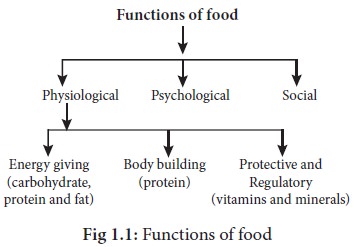Chapter: 11th Nutrition and Dietetics : Chapter 1 : Introduction to Food
Functions of food
Functions
of food
Food is important for
life. To be healthy and active, we should certainly have enough food. The food
we eat should be safe and rich in all the nutrients for our body needs. We
should choose from a wide variety of foods and we should eat them regularly,
every day. Do not forget that we should also enjoy the food that we eat; it
should look, smell and taste good. Without good nutrition, children and young
people cannot develop their potential to the full and adults will have
difficulty in doing their best.
Food provides our body
with what they need to
·
Stay alive, be active, move and work;
·
Build new cells and tissues for growth;
·
Stay healthy and heal themselves;
·
Prevent and fight infections.
Foods are classified
according to their functions in the body. The functions of food can be broadly
classified into three main categories.

1. Physiological functions of food
The physiological
functions of food can be further sub-divided as follows:
a. Energy giving
b. Body building
c. Protective and
Regulatory
a. Energy giving
This group includes
foods rich in carbohydrate, fats and proteins. Energy is defined in terms of
kilo calories and thus one gram of carbohydrate gives 4 kcal, one gram of
protein gives 4 kcal, while one gram of fat gives 9 kcal. This group may be
broadly divided into two groups:
·
Cereals, pulses, nuts and oilseeds, roots and tubers.
·
Simple carbohydrates like sugars, fats and oils.
Cereals provide in
addition to energy large amounts of protein, minerals and vitamins in the diet.
Pulses also give protein and B vitamins besides giving energy to the body. Nuts
and oilseeds are rich in energy yielding as they are good sources of fats and
proteins. Roots and tubers though mainly provides energy, contribute to some
extent to minerals and vitamins.
b. Body Building:
The foods we eat
become us. Thus one of the most important functions of food is that of building
the body. They are classified into two groups:
·
Milk, egg, meat and fish: They are rich in protein of high biological
value. These proteins have all the essential amino acids in correct proportion
for the synthesis of body tissues.
·
Pulses, oilseeds and nuts: They are rich in protein but may not contain
all the essential amino acids required by the human body.
c. Protective and Regulatory function
Foods rich in protein,
vitamins and minerals have regulatory functions in the body eg. maintaining the
heart beat, water balance and body temperature. Protective foods are broadly
classified into two groups.
·
Foods rich in vitamins, minerals and proteins of high biological
value eg. milk, egg, fish and liver.
·
Foods rich in certain vitamins and minerals only eg. green leafy
vegetables and fruits.
2. Psychological Functions of food
The second major
function of food is the psychological function. Food must also satisfy certain
emotional needs. These include sense of security, love and attention. Everyone
of us belong to a particular culture with its own unique food habits
characteristics of that culture and caste.
3. Social function of Food
Food and eating has
significant social meaning. Food is also a symbol of our social life Sharing
food with any other person implies social acceptance. When you share a meal
with someone, you are expressing your acceptance of friendship and respect for
that person. Food is a medium through which we express our happiness. For
example, feasts are given at specific stages of life, such as birth, birthday,
marriage etc.
Related Topics